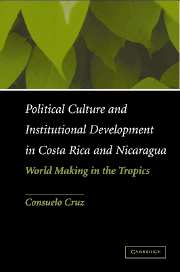 Political Culture and Institutional Development in Costa Rica and Nicaragua
Political Culture and Institutional Development in Costa Rica and Nicaragua Book contents
- Frontmatter
- Contents
- Acknowledgments
- List of Abbreviations
- Chronology
- Political Culture and Institutional Development in Costa Rica and Nicaragua
- Introduction
- 1 Theoretical Overview
- 2 Manichean Identities and Normative Scheming: Origins
- 3 Orphans of Empire: Constructing National Identities
- 4 Postcolonial Paths: Rhetorical Strategies and Frames
- 5 Costa Rica: Possibility Mongers
- 6 Nicaragua: Hybrid Arbitration
- 7 Tropical Histories: Paradise and Hell on Earth
- 8 Transition: Familiar Novelties
- Conclusion
- Index
4 - Postcolonial Paths: Rhetorical Strategies and Frames
Published online by Cambridge University Press: 20 August 2009
- Frontmatter
- Contents
- Acknowledgments
- List of Abbreviations
- Chronology
- Political Culture and Institutional Development in Costa Rica and Nicaragua
- Introduction
- 1 Theoretical Overview
- 2 Manichean Identities and Normative Scheming: Origins
- 3 Orphans of Empire: Constructing National Identities
- 4 Postcolonial Paths: Rhetorical Strategies and Frames
- 5 Costa Rica: Possibility Mongers
- 6 Nicaragua: Hybrid Arbitration
- 7 Tropical Histories: Paradise and Hell on Earth
- 8 Transition: Familiar Novelties
- Conclusion
- Index
Summary
Thrones may be out of fashion and pageantry too, but political authority still requires a cultural frame in which to define itself, and so does opposition to it.
–Clifford GeertzWhen the cultural frame for political authority vanishes, the establishment of trustworthy government structures becomes the ultimate political success. Such an outcome, however, is not foreordained. Success or failure will depend on a society's “inheritance” and on the “agency” of its political actors. After the disappearance of the royal arbiter in 1821 and the collapse of the Mexican Empire in 1823, Central Americans seemed to succeed on this score, if only for a moment.
To begin with, they adopted a foreign model of government without excessive controversy. In a mimetic exercise focused on the U.S. experience, they created a Central American Republic constitutionally grounded in the principle of election and the self-regulating principle of the checks-and-balances mechanism. Moreover, the constituent assembly managed to resolve the main points of contention by ratifying the keenly federalist project championed by liberals and opposed by conservatives.
In accordance with the federalist project (1824), the member states of the republic retained a high degree of autonomy; each would raise its own army, and each would reproduce in miniature the union's broader institutional framework. That is, each state would have its own tripartite government and electoral processes. The formula, impeccable on paper, proved disastrous in practice.
- Type
- Chapter
- Information
- Political Culture and Institutional Development in Costa Rica and NicaraguaWorld Making in the Tropics, pp. 91 - 111Publisher: Cambridge University PressPrint publication year: 2005


